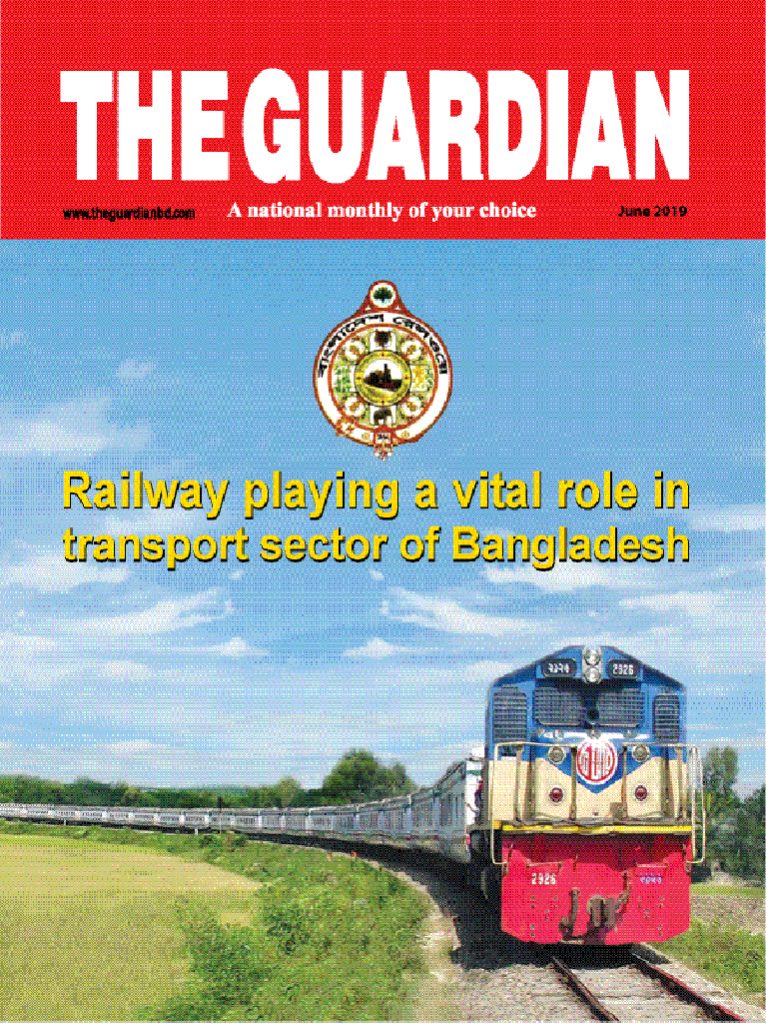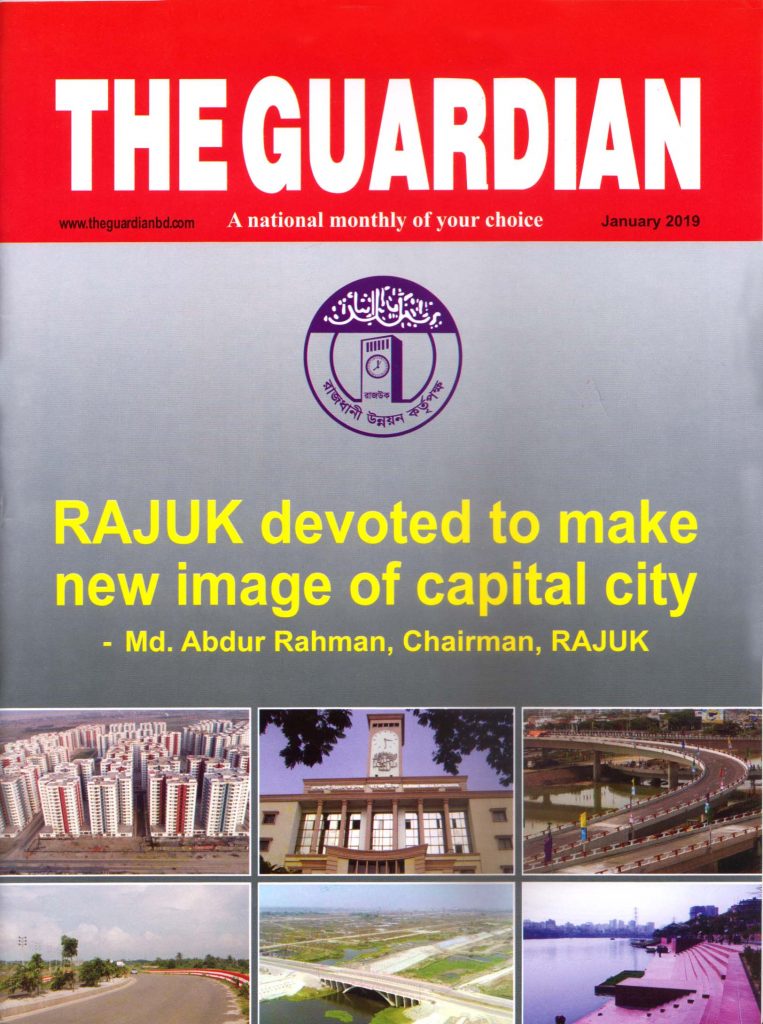Bangladesh inherits a system of taxation from its past British and Pakistani rulers and the system gradually developed on the basis of generally accepted principles with efforts towards rationalizing the tax administration for optimizing revenue collection, reducing tax evasion and preventing revenue leakage through system loss, said Md. Rustom Ali Molla, Commissioner, Taxes Zone-4, Dhaka in an exclusive interview with The Guardian.
In this context, the Commissioner further said that to make the system operational and taxpayer friendly, the tax department, a dynamic organization, always caters to the needs of time and situation.
He informed us that Taxes Zone-4, Dhaka evolved from the history of a single territorial zone in the then East Pakistan during pre-1971 era and finally came into being in 1992.
The Commissioner then mentioned that this taxes zone is different from other tax authorities because of the fact that their tax people have to deal with all government officials and employees except few categories. He added that their tax men used to take care of this very sensitive section of the society and successfully handle those people year after year and no major complaint from any taxpayer of this sophisticated category is yet to come to their notice.
He mentioned that a single unit of tax offices used to receive thousands of income tax statements every year from this group and give them all-out support in respect of tax affairs. In this context, he also said that gradual increase in terms of collection of tax, submission of return and number of total taxpayers is a sign of achievement of Taxes Zone-4.
A highly committed tax officer, Mr. Molla evaluated that Bangladesh arrives at its present position after a long history of deprivation, exploitation by foreign masters and finally nine-month-long bloody war of independence in 1971 at the sacrifice of lives of three million people and sanctity of thousands of women.
He also added that their main purpose of making this territory an independent country was to bring smiles to the faces of the countrymen by making them economically solvent and self dependent and without achieving those targets, main fruits of the long struggle would not come to the doorsteps of the people.
In this context, he said that to achieve those goals and to guarantee fundamental rights of the people enshrined in the constitution, the government needs money and the income tax officers are the only authority in the country to ensure flow of money from the domestic sources.
Keeping this in view, he urged the new generation officers of the tax department, who will serve for next few decades, to be equipped with up-to-date knowledge, modern techniques and etiquette in order to determine appropriate income, collect due taxes from assesses and ensure prompt and expected services to the clients with due diligence and also called upon the valued taxpayers to come forward with more openness to make their true disclosure of income and assets.
Mr. Molla believes through mutual cooperation and initiatives between the tax officers and the valued taxpayers, the long cherished goal of making the country a “Golden Bangla” will be achieved.
In a long exclusive interview, the Commissioner replied to several questions, covering the activities, problems, potentials, achievements and future plans of Taxes Zone-4 and the cooperation and initiative of the present government and the ministry of finance to improve the overall condition of the tax system as well as the department. His deliberations are quite interesting, educative and informative as well. The excerpts of his valuable interview are produced here for The Guardian readers at home and abroad:
The Guardian: Please give us a short introduction to the founding history of Taxes Zone-4 of NBR.
Commissioner: Bangladesh inherited a system of taxation from its past British and Pakistani rulers. The system, however, developed on the basis of generally accepted principles and there had been efforts towards rationalizing the tax administration for optimizing revenue collection, reducing tax evasion and preventing revenue leakage through system loss. To make the system operational and taxpayer friendly, the tax department, a dynamic organization, always caters to the needs of time and situation.
The present structure of the Taxes Zone-4, Dhaka evolved from the history of a single territorial zone in the then East Pakistan (now Bangladesh) during pre-1971 era, then East and West Zone after independence, then again East, West, South and North zones before the Taxes Zone-4, Dhaka finally came into being in 1992. However, during the recent 2011 massive expansion of the department, the Taxes Zone-4, Dhaka remained intact despite its jurisdiction being curtailed.
The Guardian: In this context, would you discuss the powers and functions of this Zone?
Commissioner: The Income-tax Ordinance, 1984, (ITO) governing direct revenue mobilization in the country, delegates power to and describes function of a Commissioner of Taxes (CT). As per section 6 of the ITO, the CT in charge of Taxes’ Zone- 4, Dhaka has been given a jurisdiction by National Board of Revenue (NBR), apex body of the revenue organizations, to deal with basically two types of taxpayer- corporate and individual.
To perform duties assigned by the NBR and render better services to taxpayers, the Taxes Zone-4, Dhaka allocates its jurisdiction among 22 circles, headed by officers- Deputy Commissioner of Taxes (DCT), Assistant Commissioner of Taxes (ACT) and Extra Assistant Commissioner of Taxes (EACT). Their functions are regularly supervised by four Additional/Joint Commissioner of Taxes. As mandated the Taxes Zone-4, Dhaka principally ensures taxpayers to file their income tax returns, pay taxes and carry out other responsibilities assigned by the government from time to time.
The Guardian: Would you also discuss the organizational structure of the zone?
Commissioner: The organizational structure of the zone is mentioned below:
Commissioner of Taxes (CT) is head of the zone. He is assisted by DCT, Head Quarter (Admin) and DCT, Head Quarter (Technical) who directly report him on administrative and legal matters respectively. On the other hand, four inspecting range officers are directly supervising and monitoring revenue collection and other matters of the 22 circles headed by field officers called as DCT. Six circles are supervised by Inspecting Additional Commissioner of Taxes each and five circles are monitored by Inspecting Joint Commissioner of Taxes each. Both the field officers and the Inspecting Ranges report to the CT.
The Guardian: And say on what basis a zone is set up and inform us about area coverage of this zone?
Commissioner: As stated above, the NBR assigned each taxes zone with separate jurisdiction to cover all taxpayers from all over the country. From that point of view, the Taxes Zone-4, Dhaka has been given the jurisdiction to serve the corporate and individual taxpayers.
The corporate taxpayers are
w Dhaka based private and public limited company of which name begins with alphabet C and W;
w all travel agents and manpower business houses;
w Non-company contractors and suppliers of which name begin with alphabet S;
w Readymade garments company beginning with alphabet B and N; and
w Community centre.
The individual taxpayers are
w all directors of the above mentioned corporate bodies;
w All civil servants excluding doctors and teachers; and
w Residents of Ward No. 59, 61, 62, 63 and 64 of Dhaka City Corporation and three upazillas- Dohar, Nawabganj and Keraniganj of Dhaka district.
The Guardian: In this context, would you mention the number of officers and staffs currently working under this zone?
Commissioner: To provide better services to the taxpayers under this zone, two Inspecting Additional Commissioner of Taxes, two Inspecting Joint Commissioner of Taxes, three out of six DCTs, eight ACTs and six EACTs have been functioning under the direct control and supervision of the CT.
The Guardian: Would you tell us what modern facilities are available at this zone for its officers and staffs to perform their duties well?
Commissioner: Despite various limitations, the government has been trying to make available of modern facilities down to circle offices of this zone. As part of the government initiatives, basic information of all individual taxpayers is stored in database and available at the circle level according to their jurisdiction. The CT and the inspecting range officers have access to the database and they can use the information according to their needs. All individual taxpayers’ database is linked with the information available with NID Project maintained by the Election Commission (EC).
On the other hand, corporate taxpayers’ information with the Register of Joint Stock (RJSC) is also available with the tax authority. Besides, any person who intends to be a taxpayer is given the scope to register online sitting anywhere and is allowed to get print out of the Taxpayer’s Identification Number (TIN) certificate. IT facilities like desktop, laptop and internet are provided with staff and all officers of the zone in order to quicken the taxpayers’ service.
Moreover, an exclusive website of this zone is underway to provide more up-to-date information and services to the taxpayers.
The Guardian: Would you reflect the problems and limitations of this zone?
Commissioner: As a developing country and highly densely populated nation like Bangladesh where there is always a dire challenge to make balance between supply and demand, expectation and the income tax offices like this zone is not out of that scenario.
To cope with the modern techniques arising in many fields and adaptation of those systems by the taxpayers that resulted to various ways to evade and avoided direct taxes, the tax authority is not to up to the mark but it strides to keep pace with. In a nutshell, there are lot of scope for improvement in terms of infrastructure, logistics and human resources existing in the taxes zone.
The Guardian: And say what steps are being taken to solve those?
Commissioner: As a government office, every coin is to be spent after approval from the concerned authority. Despite many limitations, the government, as a matter of pride and fact, has been taking many steps to sort out root causes of the problems and dismantle those age-old predicaments.
You may have already seen few outcomes of some of the steps taken by the government. To mention a few of those steps, a “week-long” tax fair has been organized every year in Dhaka and elsewhere in the country to give prompt service to the valued taxpayers who have no need of interaction with the tax people, which, some people say, is one of the causes of malpractice in the tax department.
In the tax fair, our zone used to set up a few booths or stalls to create awareness among the taxpayers, receive income tax returns and instantly issue acknowledgment receipt of those returns which is legally deemed to be an assessment order of the DCT. It has been found during the couple of years that almost all individual taxpayers filed their annual income statements through universal self assessment system, which does not require any traditional assessment of the DCT.
Though in few cases, a very limited percentage of those returns have been selected for audit. People/ organization can register or re-register themselves/itself by availing of the electronic TIN system by visiting and following the instructions in the website www.incometax. gov.bd, which saves time, energy and money of the taxpayers.
The Guardian: Please inform us about the achievement of this zone?
Commissioner: This taxes zone is different from other tax authorities because of the fact that our tax people have to deal with all government officials and employees except few categories. Our tax men used to take care of this very sensitive section of the society and successfully handle those people year after year. No major complaint from any taxpayer of this sophisticated category is yet to come to our notice.
A single unit of tax offices used to receive thousands of income tax statements every year from this group and give them all-out support in respect of tax affairs. Besides, gradual increase in terms of collection of tax, submission of return and number of total taxpayers is a sign of our achievement.
The figure is shown in the table below:
The Guardian: Would you disclose the future plans of this zone?
Commissioner: The main purpose of the revenue mobilization is to ensure social parity and equity and remove growing imbalance between rich and poor. To serve those purposes and ensure economic development of the country, the government has to depend on domestic resource mobilization and being income tax as direct tools of the government, our main thrust is to reach every corner of our jurisdiction to find out probable taxpayer having taxable income but hiding from paying due taxes and bring them under the tax net.
Besides, we are after the tax dodgers to collect appropriate revenue from those culprits and make deterrent measures to discourage tax avoidance and concealment of income. Moreover, we are also trying to create social awareness about the benefits of tax payment and its contribution in the development of the economy. We are also pursuing reward and punishment policy for those good and bad taxpayers respectively.
The Guardian: In this context, would you say what cooperation you are getting from the government, especially from the concerned ministry to implement your plans?
Commissioner: The taxes zone is legally independent in connection with the revenue mobilization and the steps to be taken in this regard. But in case of monetary involvement, permission is required from the government, especially from the Ministry of Finance and more specifically Internal Resources Division (IRD).
Despite monetary constraints, the government is committed, if convinced about the necessity, to offer maximum support to the initiatives and plans undertaken by the tax authority from time to time.
The Guardian: In the end, please give your valuable message for your later generation officers and also for the people of Bangladesh?
Commissioner: The country arrives at its present position after a long history of deprivation, exploitation by foreign masters and finally nine-month-long bloody war of independence in 1971 at the sacrifice of lives of three million people and sanctity of thousands of women.
Our main purpose of making this territory an independent country was to bring smiles to the faces of the countrymen by making them economically solvent and self dependent. Without achieving those targets, main fruits of the long struggle would not come to the doorsteps of the people.
To achieve those goals and to guarantee fundamental rights of the people enshrined in the constitution, the government needs money and the income tax officers are the only authority in the country to ensure flow of money from the domestic sources.
So I will request the new generation officers of the tax department, who will serve for next few decades, to be equipped with up-to-date knowledge, modern techniques and etiquette in order to determine appropriate income, collect due taxes from assesses and ensure prompt and expected services to the clients with due diligence.
Besides, our valued taxpayers have to come forward with more openness to make their true disclosure of income and assets. Through this mutual cooperation and initiatives, the long cherished goal of making the country a “Golden Bangla” will be achieved.
Short Profile of Mr. Ali
Commissioner of Taxes Md. Rustom Ali Molla was born on 12th April, 1955 in a respectable Muslim family of Gopalgonj, a historic place of Bangladesh, the birth place of the Father of the Nation Bangabandhu Sheikh Mujibur Rahman.
He passed S.S.C. Exam in 1971 (held in 1972) and M.Sc. in 1982.At the call of Bangabandhu, he joined the Liberation War. He is a heroic Freedom Fighter, trained at Chakulia, Bihar, India. He took part in our Great Liberation War in Vatiapara, Kurpala, Ghagore of Gopalgonj and in Vedorgonj and Damudda in Sariatpur and Rajbari.
Mr. Molla from his boyhood is involved with socio -cultural activities. He is Founder of Kachikanther Asor, a child and juvenile organization and Secretary General of Brihattar Faridpur Chakurijibi Kallayan Samity. He is also Member of many other socio-cultural organizations.
















